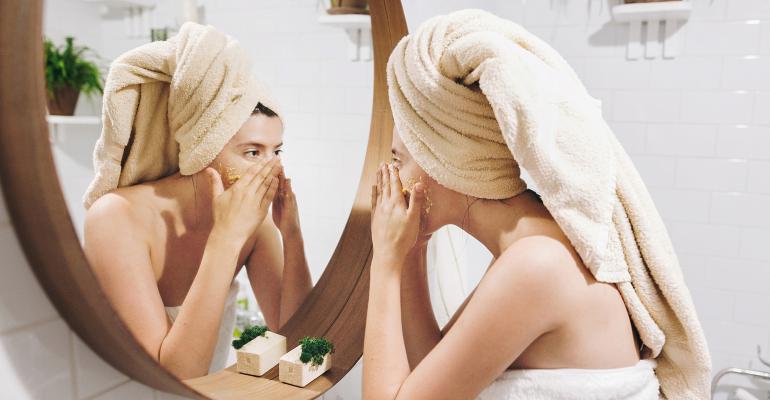(Bloomberg Opinion)—Stay-at-home living has given makeup wearers dramatically fewer occasions to draw on a smoky eye or a red lip, and the cosmetics business is feeling the pain. Ulta Beauty Inc. last week said comparable sales fell 8.9% in the latest quarter, with declines in foot traffic and weak makeup sales dragging down results. In the upscale segment of the U.S. beauty industry, sales sank 17% in the third quarter from a year earlier, according to NPD Group.
Glam No More
But that’s only a skin-deep explanation of what’s shaping beauty spending now. The situation is more nuanced than those numbers would suggest. And mercifully, for retailers and brands, there are pockets of real strength.
Besides there being few reasons to glam up, the beauty business is hurting because it benefits enormously from customers being able to try out the products, and options for doing so at brick-and-mortar stores are extremely limited thanks to pandemic safety precautions. Ulta and Sephora stores have each designated tester products as “display only,” meaning that a key part of the pleasure of shopping at these stores — to see if a skin cream feels greasy on your hands or a certain blush color looks clownish on your skin tone — is off-limits. Both chains also temporarily halted some high-contact services, including in-store makeovers. Department-store beauty counters are less experiential these days, too, with the likes of Macy’s Inc. and Nordstrom Inc. retreating from in-store makeup applications for now. In other words, it’s not just that demand for certain beauty products has been decimated, but it’s also that key selling techniques can’t be used.
Another of the beauty industry’s less obvious challenges is the plunge in air travel since the onset of the pandemic. Cosmetics, skin-care products and fragrances are popular purchases at airport gift shops and duty-free stores. In its latest annual report, Estee Lauder Cos. said travel retail outposts were “historically one of our most profitable channels.” These shopping environments are ghost towns these days, though. Dufry AG, a company with more than 2,500 travel retail stores worldwide, said sales of perfumes and cosmetics were down 82.1% in the third quarter from a year earlier.
Empty Concourses
Despite all this, there are growth opportunities for beauty brands that meet consumers where they are: at home.
Just because people are stuck inside doesn’t mean they are letting themselves go — in many cases, it’s the opposite. Being homebound and stressed out has led many shoppers to seek sanity in the form of self-care, and beauty items that allow for some of the rituals one might previously have gotten from a spa or salon treatment are enjoying a moment. Sales of nail products in the upscale beauty segment were up 13% from a year earlier in the third quarter, according to NPD, while body exfoliators jumped 48%. Hair care provides an especially clear example: Sales were up 11% overall thanks to growth in products such as hair masks, color and treatments. The one subcategory that declined was styling — which is logical, because it’s hard to imagine anyone crafting an elaborate chignon to sit around watching Netflix.
Becky With the Good Hair
While Ulta’s results didn’t precisely mirror those of the wider upscale market, they certainly reflected an embrace of at-home self-care. The chain actually recorded an increase in comparable sales in its hair-care, skin-care, bath and fragrance segments.
The resilience of the non-makeup parts of the beauty business helps explain a one-two punch of recent high-profile strategic partnerships. Target Corp. said in November it is set to open 100 Ulta shop-in-shops within its stores, while Kohl’s Corp. answered with a splashy announcement that it will offer Sephora shop-in-shops in about 850 stores. Large-format retailers want a bigger share of what looks to be a promising market over the long term, and specialists like Ulta and Sephora should help them achieve that.
There is no doubt beauty retailers and brands will be in better shape when parties, first dates and other primp-worthy occasions return in full force. Until then, though, they can count on scrubs, scents and other soothing gear to keep things from getting too ugly.
To contact the author of this story: Sarah Halzack at [email protected].
© 2020 Bloomberg L.P.

